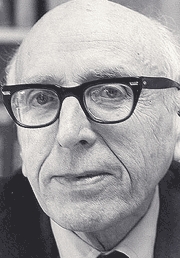On this date in 1910, Leo Pfeffer, a leading legal proponent in the mid-20th century of separation of church and state, was born in Austria-Hungary. He came to the U.S. at age 2 with his family. He was raised a Conservative Jew and remained observant, while later quipping that “the Orthodox consider me to be the worst enemy they’ve had since Haman in the Purim story!” (See featured quote below.)
After practicing law and working as associate general counsel for the American Jewish Congress, Pfeffer became a professor of political science in 1964 at Long Island University, where he taught until his retirement in 1980. He was the American Humanist Association’s Humanist of the Year in 1988.
His masterpiece, Church, State, and Freedom (1953), is the ultimate sourcebook for the history of the evolution of the principle of the separation of church and state. His eight books include The Liberties of an American: The Supreme Court Speaks (1956), Religious Freedom (1977) and Religion, State & the Burger Court (1985). Pfeffer called himself a “strict separationist in contrast to what is called ‘accommodationist.’ ”
Pfeffer pleaded “partly guilty” to inadvertently perpetuating the myth that “secular humanism” is a religion. In defending nontheist Roy Torcaso before the U.S. Supreme Court in Torcaso’s case challenging a religious test in Maryland to become a notary public, Pfeffer wrote that “there are religions which are not based on the existence of a personal deity.” His examples: Ethical Culturists, Buddhists and Confucians.
“My good friend Justice Black thought that wasn’t good enough. He put in the secular humanists. Who told him secular humanism? I didn’t have it in my brief! I couldn’t sue, because you can’t sue a justice of the Supreme Court. But since then I rued the day.” (Freethought Today, Jan/Feb 1986)
He married Freda Plotkin in 1937. They had two children, Alan Israel and Susan Beth. (D. 1993)


